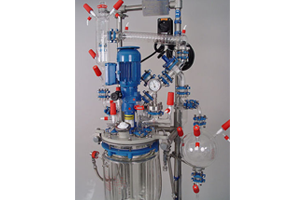
Glass Reactor / Jacketed Glass Vessel
In most of the glass plants, vessels are used as reactors, receivers, separators, measuring or feed vessels.
Vessels are available in Spherical shape from 5Ltr to 500Ltr. & in cylindrical shape from 5Ltr to 800Ltr capacity. Cylindrical vessels can be supplied with glass jackets too.
All the vessels are provided with a bottom outlet for which a suitable valve can be chosen from our range of valves.
FAQs
1. Can I customize the size and shape of the Glass Reactor/Jacketed Glass Vessel to suit my specific needs?
Yes, our Glass Reactor/Jacketed Glass Vessels are available in both spherical and cylindrical shapes, with capacities ranging from 5 liters to 800 liters. We understand that different applications may have unique requirements, and we offer customization options to meet your specific needs. Whether you require a larger capacity vessel for industrial-scale operations or a smaller vessel for laboratory experiments, we can work with you to provide a solution that fits your requirements. Additionally, cylindrical vessels can be supplied with glass jackets for processes that require temperature control.
2. What factors should be considered when selecting a glass reactor or jacketed vessel?
Consider the vessel's capacity (ranging from 5L to 500L in spherical shape and 5L to 800L in cylindrical shape), the presence of glass jackets for cylindrical vessels, and the availability of bottom outlets for valve selection.
3. What are the Features and Specifications of Glass Reactor / Jacketed Glass Reactor
- An exclusive Borosilicate Valve and tubing system designed to guarantee maximum purity and worker safety.
- Complete mobility is made possible by small, user-friendly equipment designs.
- Easy-to-use laboratory equipment on an industrial scale.
- A highly adaptable production system enables competitive lead times.
- Process glass vessels with jackets, available from 10 to 100 liters.
- Temperature range for operation: -20°C to 200°C.
- Complete vacuum up to 1 bar (based on the diameter of the vessel).
- Glass lining steel, PFA/Steel, solid glass with PTFE propellers, or metallic Teflon coating agitators marked as "High Alloy"
- Use Kalrez O-ring shaft seals or Industrial Process Mechanical Seal configurations for Dry Running PTFE.
- Economical Duty Rated or Air Operated Electrical Motors with VFD Control.
- Choice: A lab hood or containment booth with a low sash or sliding doors may be easily accessed thanks to the support provided by the Hydraulic Lifting and lower system
- Process glass feed and receivers, coil heat exchanger, and jacketed
- Several other choices exist, such as automation, data acquisition, phase separation, solids addition, reflux control, and process control.



